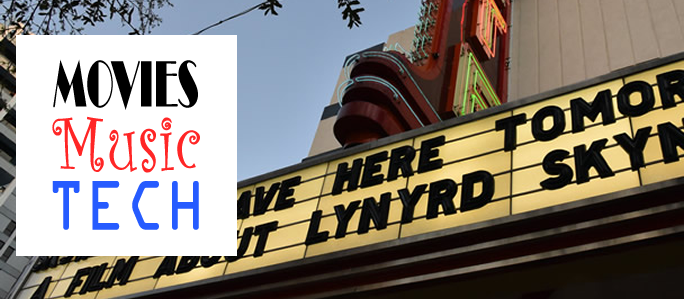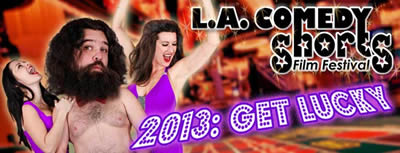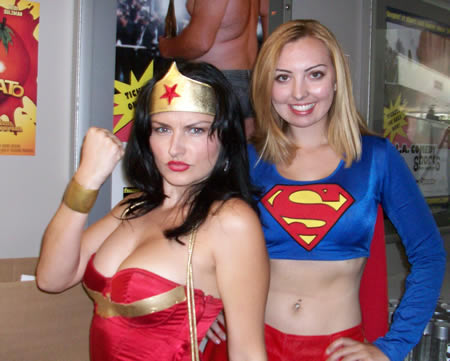This article originally appeared on blogcritics.org
I started reading works by Ayn Rand in high school 50 years ago, and I’ve never been able to shake entirely free of her ideas. Now I go to the desert to contemplate those ideas. OK, it’s not quite as mystical as it sounds, because that part of the desert to which I’m going not only contains her ideas, it also contains Las Vegas and the third edition of the Anthem Film Festival.
The Anthem Film Festival, part of the FreedomFest Conference, runs from July 10-13, 2013, at Planet Hollywood. The four days of films will include documentaries, narrative features and panels with filmmakers, all revolving around the theme: “Individuality, Accountability, Choice.”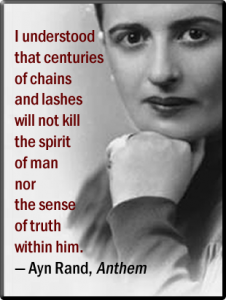
The name “Anthem” is inspired by Ayn Rand’s second book, considered by many to be her best storytelling. Written in 1937, it pioneered the dystopian future story like George Orwell’s 1984 (1948) and Ray Bradbury’sFahrenheit 451 (1953). The festival aims at showing films that promote Rand-inspired libertarian principles.
I interviewed Anthem Film Festival founder and director Jo Ann Skousen.
Jo Ann, what was the inspiration for founding the Anthem Film Festival? Were you sure there were enough libertarian films out there?
I love movies. I’m the entertainment editor for Liberty Magazine, so I see a lot of movies, and I review them with a libertarian slant. I love character-driven movies about protagonists who overcome obstacles by themselves, without turning to the government. I love looking for metaphors and allusions in films — and I often find them, even when the filmmaker didn’t deliberately intend them. I wanted to create a venue for libertarian filmmakers to show their work, and I wanted to encourage more filmmakers to consider libertarian ideals.
How does your screening process work?
I make the time to watch every movie submitted. Some I reject because the production values aren’t good enough or because they don’t have a libertarian theme. Others I accept immediately, because I know our audience will love them. Those I’m not sure about I send to respected colleagues for their advice. Interestingly, the film that ended up winning the Grand Prize last year was one I wasn’t sure about at first, and I almost rejected it. I’m so glad my judges convinced me to take a second look! It really was excellent.
Who are this year’s judges?
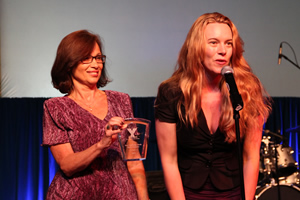
Marc Eliot, a Hollywood biographer and insider, Bob Bowdon of Choice Media, Gary Alexander, a hard-core libertarian and “renaissance man,” whose opinions on art, music, movies, and other media I trust and Courtney Balaker, whose The Conversation was last year’s winner for short narrative/libertarian ideals.
Will they be scoring the films on political factors or just on artistic?
Yes, I try to reward both thematic and artistic merit. We give three different awards for each category: Excellence in Filmmaking, Libertarian Ideals, and Best Overall. A film might be well made but not be overwhelmingly libertarian, or it might have a great libertarian message but not have the best production values. The Best Overall will have both.
I’m sure directing the festival is a lot of work. What is the element of it that gives you the most satisfaction and makes it worthwhile?
The very best part is getting to know the filmmakers. I know how exciting it is to have a work recognized and selected. Most of them attend each other’s screenings and make comments in the Q & A. They hang out together and go to the FreedomFest events. I think a lot of them keep in touch afterward. I noticed that one of my 2011 filmmakers donated to another 2011 filmmaker’s Kickstarter campaign. That made me happy.
At last year’s RightOnline conference, Scott Rasmussen emphasized that “Politics follows culture, not the other way around.” Beyond getting their films shown at Anthem, how can libertarian filmmakers work to change the culture?
I would like to see them make more narrative features with libertarian protagonists, instead of always focusing on anti-government documentaries and stories set in dystopian futures. I love a good documentary, and my audiences do to. But I think narrative stories have more power to change culture because they are more subtle. The audience begins to identify with the protagonist, and in so doing, begins to think and feel like a libertarian. Of course, narratives are a lot more expensive to make than documentaries, and it’s harder to direct an actor than to film a person being himself for a documentary. But that’s what I’m hoping to attract as our festival becomes better known.
More information about the Anthem Film Festival, check their website. For more information about me contemplating Rand in the desert, well, you know what they say about Vegas.
